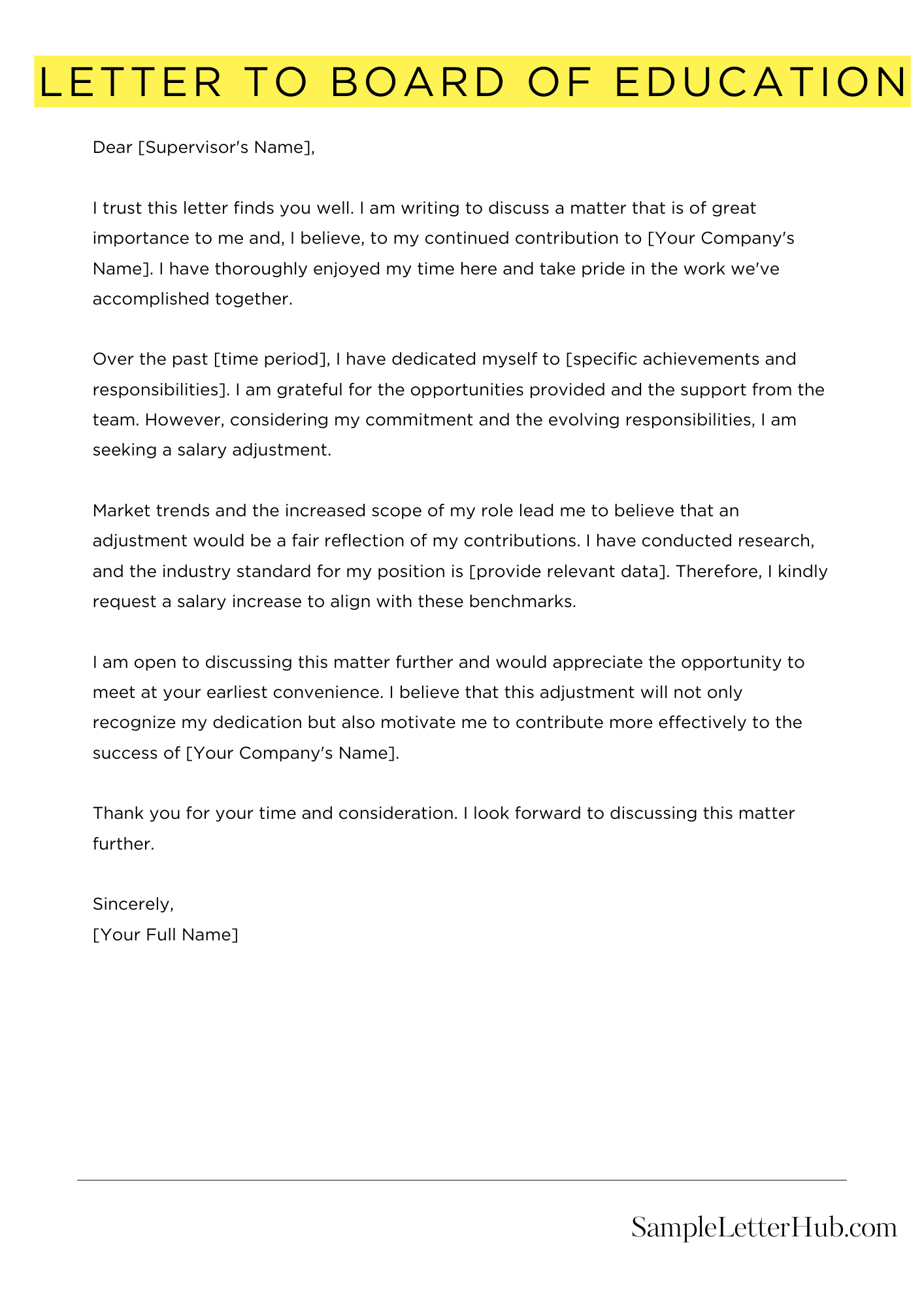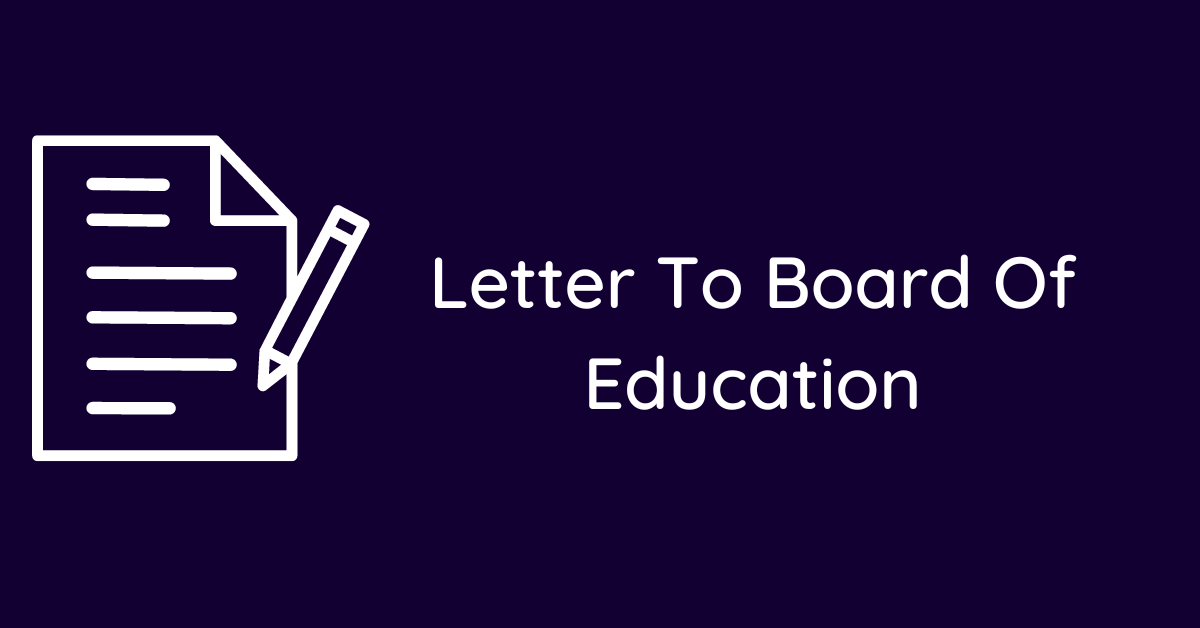Are you struggling to write a letter to the Board of Education? Look no further! Our blog article provides templates, examples, and samples of letters to the Board of Education to make the process easier for you.
Writing a letter to the Board of Education can be intimidating, but it is an important way to voice your concerns or opinions about education policies and decisions.
Our article aims to simplify the process by providing you with various templates and examples that you can use as a guide to write your own letter.
Whether you are a concerned parent, teacher, or community member, our samples of letters to the Board of Education will help you effectively communicate your message.
Keep reading to find the perfect template for your letter and make your voice heard!
Letter To Board Of Education
Dear Members of the Board of Education,
I hope this letter finds you in good health. My name is [Your Full Name], and I am a concerned [parent/resident/stakeholder] within the [School District Name]. I am writing to bring your attention to a matter of importance that directly impacts the students, parents, and community members associated with our school district.
[Describe the specific concern or proposal you wish to address. Provide background information and any relevant details that will help the Board understand the issue.]
It is my sincere belief that addressing this matter will contribute to the overall improvement of our educational environment and the well-being of those it serves. I kindly request that the Board of Education thoroughly review and consider the proposal outlined above.
I would be more than willing to discuss this matter further at your convenience. Your dedication to the betterment of our educational system is greatly appreciated, and I trust that you will give due consideration to this request.
Thank you for your time and commitment to our community’s education. I look forward to a positive resolution and continued collaboration for the enhancement of our school district.
Sincerely,
[Your Full Name]
Letters To Board Members
Dear [Board Members’ Last Names],
I trust this letter finds you well. My name is [Your Full Name], and I am writing to express my [appreciation/concern/interest] regarding the work and decisions made by the esteemed members of our Board.
[Provide specific details or examples of the positive impact or concern you wish to address. Be clear and concise in your communication to ensure your message is understood.]
I believe that your commitment to [organization/company mission] has a profound effect on [mention the community, stakeholders, or relevant group]. Your dedication is evident, and I wanted to take a moment to acknowledge the positive strides that have been made under your guidance.
Alternatively, I would like to bring to your attention [specific concern or suggestion]. It is my hope that this matter can be reviewed and addressed for the continued improvement of our [organization/company].
Thank you for your time and consideration. Your efforts contribute significantly to the success of our [organization/company], and your hard work is genuinely appreciated by the community.
Sincerely,
[Your Full Name]
Formal Letter To Board Of Directors
Dear [Board Members’ Last Names],
I trust this letter finds you in good health and high spirits. I am writing to formally express my [appreciation/concern/proposal] to the esteemed members of the Board of Directors.
[Provide detailed information regarding the purpose of the letter. Be articulate in presenting your thoughts and ensure clarity in your expression.]
As stakeholders in [Organization/Company Name], your leadership has been instrumental in guiding the organization towards [success/achievement/goals]. I would like to extend my sincere gratitude for your dedication and strategic vision.
Alternatively, I wish to bring to your attention [specific concern or proposal]. It is my belief that addressing this matter will contribute positively to the overall growth and success of our organization.
I appreciate the valuable time and effort you invest in steering [Organization/Company Name] to new heights. Your commitment to excellence does not go unnoticed, and I am confident that, under your leadership, our organization will continue to thrive.
Thank you for your unwavering commitment to the betterment of [Organization/Company Name]. I look forward to witnessing continued success and advancements under your esteemed guidance.
Sincerely,
[Your Full Name]
Sample Complaint Letter To Board Of Education
Dear Members of the Board of Education,
I hope this letter finds you in good health. I am writing to express my concerns regarding an issue I have encountered within the [School District Name]. It is with a sense of responsibility and a genuine desire for improvement that I bring this matter to your attention.
[Clearly and concisely describe the nature of the issue or complaint. Include any relevant details, such as dates, names, and locations, to provide a comprehensive understanding of the situation.]
I understand the challenges faced by educational institutions, but I believe that addressing this concern is crucial for the well-being and development of the students in our community. I request a thorough investigation into this matter and appropriate actions to remedy the situation.
As a stakeholder in our educational system, I trust in the commitment of the Board of Education to uphold the highest standards and ensure a positive learning environment for our students. Your attention to this matter is greatly appreciated.
Thank you for your time and consideration. I look forward to a resolution that fosters a healthy and supportive educational environment within our community.
Sincerely,
[Your Full Name]
Retirement Letter To Board Of Education
Dear Members of the Board of Education,
After [Number of Years] years of dedicated service to the [School District Name], I am writing to formally announce my retirement from the position of [Your Position]. It has been an incredible journey, and I am grateful for the opportunities for personal and professional growth that this district has provided me.
I have had the privilege of working with outstanding colleagues, administrators, and students. The memories and experiences I’ve gained during my time here will forever hold a special place in my heart. As I step into the next chapter of my life, I carry with me the valuable lessons and friendships forged in this remarkable educational community.
I would like to express my gratitude to the Board of Education for their unwavering support and commitment to fostering a positive and enriching environment for both educators and students. It is reassuring to know that our district is in capable hands, and I am confident that the tradition of excellence will continue.
Thank you once again for the privilege of serving the [School District Name]. I look forward to witnessing the continued success and achievements of our students and the entire educational community.
Wishing you all the best in the future,
[Your Full Name]

How to Write a Letter to Board of Education
Writing a letter to the Board of Education can be a daunting task, but it is an important way to voice your concerns and opinions about education policies and practices.
Whether you are a parent, student, teacher, or community member, your letter can make a difference in shaping the future of education in your area. Here are seven steps to help you write an effective letter to the Board of Education.
1. Research the Board of Education
Before you start writing your letter, it is important to research the Board of Education in your area. Find out who the members are, what their roles and responsibilities are, and what issues they are currently addressing. This information can help you tailor your letter to the specific concerns and priorities of the Board.
2. Identify your purpose
What is the purpose of your letter? Are you advocating for a specific policy change, expressing your support or opposition to a particular decision, or sharing your personal experience or perspective? Clearly identifying your purpose will help you focus your message and make it more compelling.
3. Use a professional tone
When writing a letter to the Board of Education, it is important to use a professional tone. Avoid using emotional language or attacking individuals. Instead, focus on presenting your arguments and evidence in a clear and respectful manner.
4. Provide evidence
To make your letter more persuasive, provide evidence to support your arguments. This can include statistics, research studies, personal anecdotes, or expert opinions. Be sure to cite your sources and provide links or references where possible.
5. Be concise
The Board of Education members are busy people, so it is important to be concise in your letter. Keep your message focused and to the point, and avoid rambling or repeating yourself. Use short sentences and paragraphs to make your letter easy to read.
6. Make a specific request
At the end of your letter, make a specific request of the Board of Education. This could be to consider a particular policy change, to provide more resources for a specific program, or to address a particular issue. Be clear and specific about what you are asking for.
7. Follow up
After you have sent your letter, follow up with the Board of Education to ensure that your message has been received and considered. You can do this by attending Board meetings, contacting individual members, or reaching out to the Board’s administrative staff.
FAQs About Letter to Board of Education
1. What is a letter to the Board of Education?
A letter to the Board of Education is a written communication addressed to the governing body of a school district or educational institution. It is usually written by parents, students, or concerned citizens to express their opinions, concerns, or suggestions regarding educational policies, programs, or practices.
2. Why would someone write a letter to the Board of Education?
People write letters to the Board of Education for various reasons, such as to request changes in curriculum, express concerns about school safety, voice opinions on school policies, or suggest improvements in educational programs. It is a way for individuals to have their voices heard and to influence decision-making in the educational system.
3. How should I format my letter to the Board of Education?
Your letter should be written in a professional and respectful tone, with a clear and concise message. It should include your name, address, and contact information, as well as a clear statement of your purpose for writing. You should also provide any relevant background information or evidence to support your position.
4. Who should I address my letter to?
You should address your letter to the Board of Education as a whole, rather than to a specific individual. You can usually find the contact information for the Board of Education on the school district’s website or by contacting the district office.
5. What should I do if I don’t receive a response to my letter?
If you do not receive a response to your letter within a reasonable amount of time, you may want to follow up with a phone call or email to the Board of Education. You can also attend a Board meeting to address your concerns in person during the public comment period.
6. Can I submit my letter anonymously?
While you have the right to submit your letter anonymously, it is generally more effective to include your name and contact information. This allows the Board of Education to follow up with you if they have any questions or need additional information.
7. What impact can a letter to the Board of Education have?
A well-written and thoughtful letter to the Board of Education can have a significant impact on educational policies, programs, and practices. It can bring attention to important issues, influence decision-making, and lead to positive changes in the educational system.
Related:
- Letter To The Bride Book ( 5 Samples )
- Authorization Letter To Bank ( 5 Samples )
- Day care Welcome Letter To Parents ( 5 Samples )
- Letter Of Appeal To Insurance ( 5 Samples )
- Letter To Remove Credit Inquiries (5 Samples)

